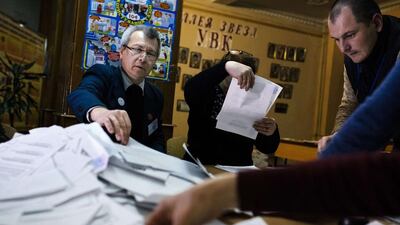Ukraine’s uneasy truce is close to collapse. Last weekend, pro-Russian separatists staged elections in the self-declared republics of the country’s contested border regions with Russia. While Moscow said that it would respect the “will of the people”, the pro-western government in Kiev and its supporters in the United States and the European Union denounced the vote as a sham that is illegal and illegitimate.
Ukraine’s president Petro Poroshenko has called the vote a “farce” and warned that he will scrap an autonomy deal for the rebel-held areas, which is a key part of the recent peace process. The fragile ceasefire that was agreed on September 5 by all parties now hangs by a thread.
Most worryingly, the move threatens to unleash a new wave of violence that could plunge Ukraine into a fully-fledged civil war and drag Russia and the West into a military conflict neither side can afford.
Of course this continuous crisis concerns Ukrainians most of all, especially ordinary civilians across the country who have lost their land and even their loved ones in the war raging since Moscow’s annexation of Crimea in March.
However, the fighting would not have continued without all the external meddling, especially by Russia but also the US and the EU. As so often in the past, Ukraine is merely a pawn in a larger geopolitical game between rival “great powers” and their overlapping spheres of interest.
At the start of the Ukrainian crisis, the West sought to pull the country into its own orbit. In response, the Kremlin’s Crimean land-grab was primarily designed to shore up Russian strategic interest, notably control over Sebastopol, which is Moscow’s only warm-water naval base and guarantees direct access to the Mediterranean.
And when the new leadership in Kiev seemed on the verge of putting down the separatist insurgency and consolidating ties with the West, Russia sent in troops and inflicted a morale-sapping defeat on the Ukrainian army from which it has never recovered. Since then the standoff has mutated into a frozen conflict that could erupt into war at any point unless there is an overarching political settlement.
Under Vladimir Putin, the Kremlin won’t stop interfering until Kiev and its western supporters acknowledge what Moscow views as its vital interests, including Ukraine’s military neutrality, which rules out Nato membership, and close socio-economic ties between the country’s east and Russia.
To bolster the rebels’ position on the ground and satisfy the forces of resurgent nationalism at home, Mr Putin has pledged his support for the people of New Russia – an old imperial notion stretching back to tsarist times that refers to the wider area from western Russia via Ukraine’s Black Sea coast and the strategic city of Odessa all the way to Transnistria. The latter is home to another frozen conflict with a large ethnic-Russian minority and a significant Moscow military contingent, just like South Ossetia and Abkhazia that were the object of a five-day war between Russia and Georgia in 2008.
Maintaining “statelets” such as New Russia or Transnistria gives the Kremlin leverage and stops nominally sovereign countries such as Ukraine or Georgia from joining Nato. In the case of New Russia, it also provides a strategically important land bridge from Russia to Crimea.
For its part Kiev is backing local militia who wage an often brutal campaign against the pro-Russian separatists and their popular supporters, while the West hopes in vain to coerce Moscow into changing tack by threatening to intensify the sanctions regime that is reminiscent of Cold War strategies of containment through boycott.
However, the tensions between Russia and the West over Ukraine and the other frozen conflicts foreshadow less a new Cold War than a resurgence of “great power” competition over power and resources involving the West, Russia, China and a host of new regional forces.
Compared with the past, the key difference today is that for the foreseeable future no one will rule the world – with the US struggling to maintain its pre-eminent status and China seeking to challenge the Western-centric international order. Like Beijing, Moscow increasingly rejects what it considers to be western concepts such as individual human rights or international law, which the West itself fails to uphold – whether in the case of Kosovo’s independence from Serbia or regime change in Libya under the pretence of a humanitarian intervention.
From Russia’s perspective, supposedly universal values are in reality just particular Western norms at the service of the West’s interests. While Moscow purports to adhere to the letter of the law, it now seeks to extend the informal, personalised rule from the domestic arena to the international stage. That involves doing deals that reflect informal understandings about spheres of interests rather than written agreements based on shared principles.
Thus appeals by the West to return to the post-Cold War system of universally agreed liberal values and international law won’t work. When levels of trust between political leaders are so low and countries have clearly conflicting interests, then everything is an exception to the rule. Paradoxically, exceptions become the new norm, including western military interventions and Russian-backed separatism.
To avoid a slide into uncontrollable chaos, global and regional powers need to devise new rules and new institutions. But amid so much mutual distrust and suspicion, a new world order is a long way off.
Adrian Pabst is senior lecturer in Politics at Britain’s University of Kent and visiting professor at the Institut d’Etudes Politiques de Lille (Sciences Po), France

